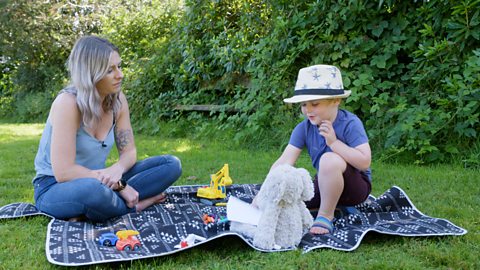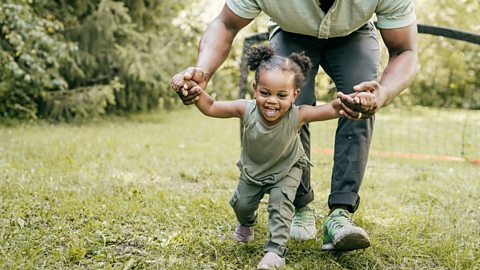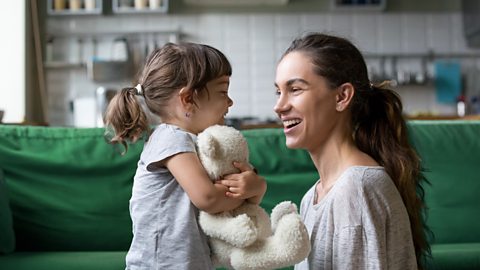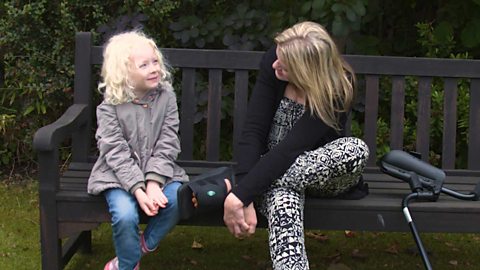Your child does a lot of learning in their first five years, from adorable newborns to the so-called 'terrible twos', all the way to starting school. What are some skills you can help them to develop before they turn five?
If your little one hasnât picked up some of these skills, donât worry! Every child learns at different rates. Young children are learning all the time from those around them, so spending time with your child, playing and talking with them is really helpful for their development.

1. Sharing
Sharing is a skill that comes naturally to some, but less naturally to others (adults included).
From around 2 Âœ years old, children can usually share or take turns. But, typically itâs not until the ages of 3 to 5 when they stop getting frustrated when sharing with others.
Some toddlers take longer to develop their sharing skills - often thatâs no one's fault, they simply lack the cognitive ability to do so at that age.
A fun way to build sharing skills is to encourage your child to share objects with their toys through pretend play. You can try this by getting a group of teddies or toys and seeing if your child can share things between them equally. If they want to have a different item, maybe they could first ask the toy to see if theyâd like to swap?
Remember that children learn by copying what they see, so donât be afraid to show them how itâs done.
Kindness and fairness are closely linked to sharing. When practising, itâs useful to make clear, positive statements about why sharing benefits everyone. Once your child has started to get a grip on sharing, itâs a good idea to begin introducing ideas of fairness.
Fairness is a difficult concept for a child to grasp, so seeing it demonstrated in front of them will help them to understand. It can help to link this to everyday experiences such as mealtimes - why do they have a larger serving than their younger sibling? How is this fair?
2. Getting comfortable in the kitchen
Getting your little one to help you bake a cake or cook a meal is a fantastic opportunity to develop their language skills, as well as to encourage them to try new foods and even practise counting.
If your child is helping you in the kitchen, remember to use lots of different describing words, ask open-ended questions and encourage your child to ask questions of their own. The kitchen is full of new objects and ideas - inspire their curiosity and creativity!
The kitchen is also a great place for your little one to make food choices, which is great for their independence, confidence and school-readiness. You could ask them if they want a red or yellow pepper in a recipe, or what they want to put on a cake. By letting them make choices, you are giving them an opportunity to practise decision-making while using the words they know in context.
Just remember, the kitchen can be a dangerous place for a curious toddler - so be careful with hot pans and sharp knives, and always explain the risks associated with baking and cooking.
- Learn more about having your toddler help you in the kitchen or check out this list of child-friendly recipes.

3. Exploring outdoors
Children learn so much from the world around them and there are so many ways to help them along. You could head out on a nature walk, chat about what they can see outside the window, or talk about the sounds they can hear when out and about.
Children can have a lot of energy, one of the best things about exploring outside is it gives them a chance to run, jump, climb, and play in a way they might not be able to at home â this helps children to participate in ârisky playâ, presenting them with challenges which, when met, help to develop motivation, creativity and self-confidence.
4. Learning a nursery rhyme by heart
Itâs no secret that nursery rhymes are fantastic for language development. By the time children reach their fifth birthday they might be able to recite one of their favourite rhymes from memory (admittedly some of the words might not be perfect, but weâve got you covered).
The reason toddlers can remember whole rhymes from memory before they can read and write is due to their developing phonological awareness - this is an understanding of the different sounds that make up words and the ability to spot similarities and differences between them.
Encouraging your little one to play around with rhyming words and sounds is a great way to help their language development, and even gets them ready for learning to read.
Some rhymes can also support and encourage turn-taking, which links to the development of sharing skills. 'Knowing something', like a rhyme, builds self-confidence and social skills, as it gives them a sense of achievement.
- Stuck for a nursery rhyme to teach your toddler? Why not take a look at our nursery rhyme resources.

5. Talking about how they feel
Have you ever had a day where you felt down but couldnât put your finger on why? Imagine how hard it would be to talk about how you felt if you didnât understand the meaning of âhappyâ or âsadâ.
Fortunately, by the time a child is 2-3 years old, they might be able to name feelings, and by the time they reach 4 they may begin noticing feelings in the people around them. By the time your child reaches 5 years old, they might understand emotions enough to be able to communicate how they feel.
Humans have a wide range of emotions and feelings, and it can take a long time for a toddler to learn and understand them all. Sometimes when a child doesnât understand how they are feeling or canât put a name to the emotion, they might have a tantrum.
Building and supporting your childâs emotional understanding is an ongoing process â you can help them along by showing how you talk about your own feelings â âI felt sad when I lost my favourite scarf, but Iâm happy now that Iâve found it!â
- Explore the Tiny Happy People Emotional Development collection.






